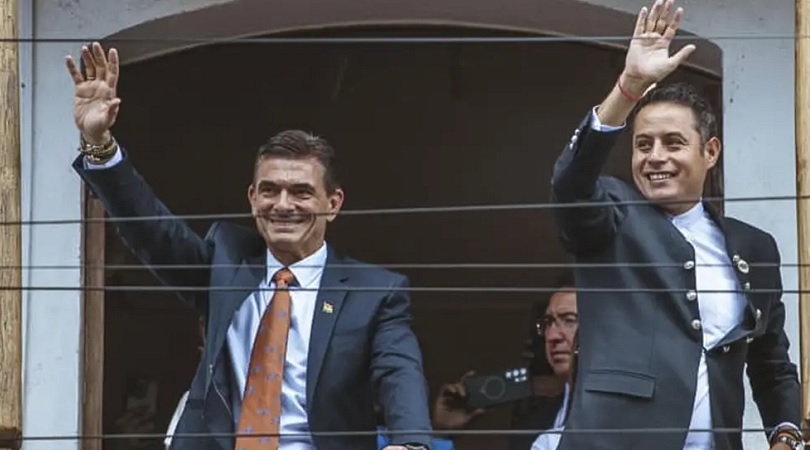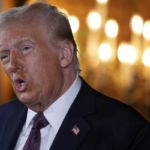
An assumption with the stamp of right-wing, religion and imperialist subordination
This Saturday, November 8, Rodrigo Paz Pereira will assume the presidency of Bolivia accompanied by a large delegation of figures from the Latin American and global right. Among the 45 confirmed guests are Javier Milei (Argentina), US Undersecretary of State Christopher Landau, and the representative of Nayib Bukele’s government (El Salvador). A constellation of figures who, in their countries, unload adjustments on workers, criminalize protest and align their foreign policies with the interests of Washington and Tel Aviv.
The ideological shift is already expressed within the country: at the request of the new legislators, the plenary session of the Chamber of Deputies approved this Tuesday – by more than two-thirds – the replacement of the crucifix and the Bible for the oath of the legislative authorities for the period 2025-2030, just as with the 2019 coup d’état. A decision that, far from being a mere symbolic gesture, expresses the advance of religious conservatism and the attempt to reinstate clerical values as part of the new power bloc. The new government, which proclaims itself “of unity and reconciliation,” thus presents itself as a restorer of the old oligarchic order, clothed in Christian morality, free markets and imperialist submission.
Milei, Bukele and Landau: different faces of adjustment, repression and Zionism
Argentine President Javier Milei arrives in Bolivia as the most extreme face of neoliberalism. In just one year, it applied a brutal adjustment dictated by the IMF: massive layoffs in the State, high tariffs, cuts in subsidies and criminalization of protest. His government has consolidated a repressive regime at the service of big financial capital and corporations. In international politics, Milei is one of the main defenders of the State of Israel, to which he promised to move the Argentine embassy to Jerusalem in an open provocation to the Palestinian people and whose genocidal actions in Gaza he has openly justified “in defense of freedom.”
For his part, Salvadoran Nayib Bukele, a “role model” for Vice President Edman Lara, governs with authoritarian methods, basing his popularity on the militarization of the country and the mass imprisonment of more than 80,000 people, many without due process. It has destroyed union rights, persecuted social organizations and consolidated a total surveillance regime. In foreign policy, it supports Zionism and shows itself as a strategic ally of Washington.
Likewise, the presence of Christopher Landau – Undersecretary of State and former Trump ambassador to Mexico – at the inauguration of Rodrigo Paz Pereira, represents the return of North American imperialism to the Bolivian scene. Washington seeks to guarantee a “reliable” Bolivia for transnational businesses, the control of lithium and the containment of the processes of class struggle. Landau symbolizes this strategy: promoting economic openness, strengthening the role of corporations and reinstalling United States political guardianship over the country. Its arrival occurs in a context in which Bolivian lithium is key in the global dispute between the United States and China, and where North American imperialism seeks to regain control of strategic resources under the discourse of the “free market.”
Actually, Bolivia occupies a strategic place for capitalist interests due to its status as a country that possesses essential raw materials – such as lithium, gas and other natural common goods – which are the subject of growing competition between the United States, China and other powers. The 2019 coup itself was a concrete expression of these geopolitical tensions, where the control of resources and the orientation of the State were defined based on the interests of transnational capital. What changes today is not the existence of that dispute, but the most explicit alignment of the new government with the imperialist bloc headed by Washingtonunder the discourse of “openness to the world” and “legal security” for foreign investments.
Finally, The recent release of the former de facto president Jeanine Áñez, executor of the 2019 coup d’état, is another symptom of the new political climate that opens with the government of Rodrigo Paz.
Áñez was directly responsible for the bloody repression in Senkata, Sacaba and Ovejuyo, where dozens of workers and peasants were murdered by military and police forces. His release from prison, in a context of “national reconciliation” promoted by the new power bloc, represents a concession to the coup sectors and the armed forces, and is part of the attempt to close the cycle of impunity for the coup.
Furthermore, his announced presence at the inauguration ceremony of Rodrigo Paz symbolizes the full political reintegration of those responsible for the coup regime into the new institutional order.
That Áñez – who headed a de facto government imposed under the tutelage of the OAS and with the support of the US – shares the ceremony with figures such as Javier Milei, the US envoy Christopher Landau and Bukele’s representative, is not a coincidence: expresses the continental articulation of a reactionary bloc that combines neoliberalism, repression and imperialist subordination. The joint presence of these actors, internal and external, sets the stage for a conservative restoration that seeks to legitimize the neoliberal and pro-imperialist project that that coup tried to impose. Behind the discourse of “unity” and “reconciliation” those responsible for crimes against the people are hidden and a scenario of impunity opens up under the democratic veneer.
Bible and crucifix: the reactionary morality of the new political bloc
The parliamentary decision to replace the Bible and the crucifix in the swearing-in ceremonies of the legislative authorities reinforces the conservative tone of the new cycle. It is a gesture loaded with political symbolism: the alliance between neoliberalism and religious fundamentalism, a classic formula of the reactionary governments of Latin America.
Just as Milei invokes “God and market freedom,” and Bukele uses religion to legitimize repression, The new parliamentary majority in Bolivia seeks to invest the Paz-Lara government with Christian morals and values, which is why the discourse of the right is openly presented in opposition to the ancestral values that symbolize the wiphala and the pachamama.expressions of a community worldview that vindicates the harmonious relationship between people and nature.
The exaltation of the “Bible and the crucifix” thus functions as an ideological operation to displace the worldview of the native peoples from the context and reinstate the cultural hegemony of the old oligarchic order. Behind the discourse of “morals and values” hides an ideological offensive against women’s rights, secular education and dissident sectors, preparing the ground for a conservative and patriarchal order at the service of the dominant classes.
Palestine, Bolivia and the common struggle against capital and colonial oppression
The governments invited to take office – Milei, Bukele, Landau – are the same ones that support or justify the Israeli genocide against the Palestinian people, and that apply war policies against the workers and the poor in their own countries. Its presence in Bolivia symbolizes a continental unity of capital against the oppressed, a neoliberal, clerical and pro-imperialist offensive. The Paz government seeks to impose a “social peace” based on consensus with businessmen and worker and popular demobilization. However, Bolivian history teaches that no neoliberal project can be sustained without facing the resistance of the workers and the people.
The central challenge for workers, as well as for social movements, is to reconstruct a truly independent political alternative, both from the government and from the bureaucratic leaderships that seek to contain the mobilization of the working class. This task implies recovering the initiative from below, with a class and workers’ democracy perspective, to confront the policies of adjustment and repression that sustain the capitalist order. Faced with this, It is necessary to raise an internationalist response that links local struggles with the resistance of the people of the world, particularly with that of the Palestinian people, victims of a genocide legitimized by the imperialist powers. The construction of an alternative of this type can only be oriented towards the perspective of a government of the workers and the people, based on self-organization, international solidarity and the socialist transformation of society.
The assumption of Rodrigo Paz expresses the deepening of the old order: capitalist, patriarchal and subordinate to imperialism. But the working class and the impoverished people – forged in the mining insurrections, the water and gas wars – have the memory and strength to resist. Today more than ever, it is necessary to raise a working-class, socialist and anti-imperialist alternative.
Source: www.laizquierdadiario.com

